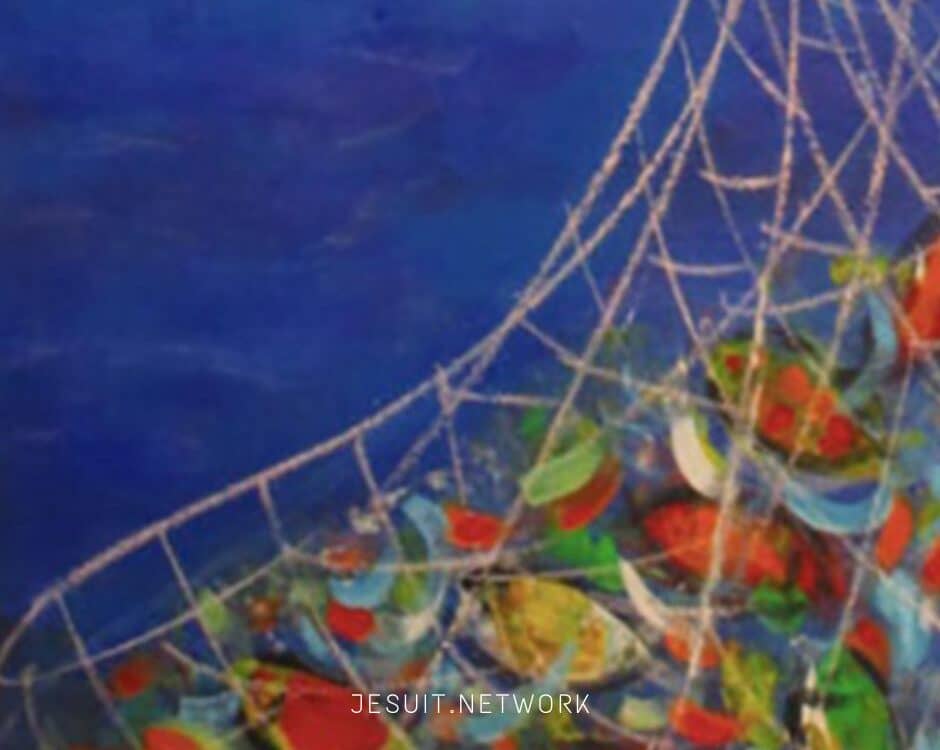This website uses cookies so that we can provide you with the best user experience possible. Cookie information is stored in your browser and performs functions such as recognising you when you return to our website and helping our team to understand which sections of the website you find most interesting and useful.
The Superior General of the Society of Jesus invites Jesuits to think more in terms of ‘we collaborate’ rather than ‘they collaborate’
[This is an adapted version in English of the post published originally in Spanish in the blog of InfoSJ]
The visit of the Superior General of the Society of Jesus, Arturo Sosa SJ, to the PAL (Local Apostolic Platform) of Valladolid, Villagarcía and León began in the infirmary of Villagarcía de Campos on Sunday morning. Accompanied by the Provincial of Spain, Antonio España SJ, the assistant of Southern Europe, Joaquín Barrero SJ, the delegate for the Elderly, Cipriano Díaz SJ, and the delegate of the PAL, Gerardo Villar SJ, Fr. Sosa toured the rooms greeting residents and staff that care for the elderly. A friendship meeting between colleagues at 12 o’clock extended to more Jesuits (over a hundred) in the Chapel of Christ –recently reformed-. He introduced himself as the Jesuit that admires and is grateful to know Villagarcía. “It’s like a myth”, he said, referring to all the news of the novitiate and their practices told by the Spanish Jesuits who arrived in Venezuela, his native country. He commented that when he entered the Society of Jesus, the Jesuits had only been in Venezuela for 50 years and 40 percent of his companions were Spaniards. However, they achieved a good transition thanks to their inculturation from which they transmitted their passion for Jesus.
The core of the talk by Arturo Sosa SJ came from the General Congregation 36, the meeting where he was elected Superior General to replace Adolfo Nicolás SJ in 2016 and whose decrees mark the future of the Jesuit vocation towards ‘reconciliation’. “With all that complexity of a wounded, moving and unequal world, there can only be healing if there is justice, mercy and forgiveness.” For Fr. Sosa, the sense of reconciliation has been present in the core of the Society from previous congregations, although it was expressed from other dimensions such as faith and justice, dialogue between cultures and religions. The current challenge is that this future is to be built in collaboration with others. “GC36 was more concerned with the way we do than with what we do”, he explained, and among the ways of doing things, he pointed out discernment as a first way to work and that goes hand in hand with the apostolic planning of “getting to do things better, to do more and better” as well as working along with others. “The mission of the Society of Jesus is not the mission of the Society itself but that of the Church, because since we were born, we were born to serve the Church.” He invited the Jesuits to change ‘their minds’ and think more in terms of ‘we collaborate’ rather than ‘they collaborate’. And he added that we must: “share the mission even with those who do not share the faith but who do share the mission”.
Arturo Sosa SJ also reviewed the three mandates of the GC36 to the Jesuits: the in-depth review of the apostolic preferences with the greatest participation of the Jesuits. A work that will last 10 years –time that will be devoted to the planning of how these preferences will be carried out. The second mandate is to review the status of poverty and the rules of administration of temporary assets. “It puts us in an important spiritual situation because it puts us in front of one of the thorniest issues such as poverty.” He recalled how the first Jesuits lived the poverty from which the Society of Jesus was born and the vow pronounced by the Jesuits. “The image we give is not that we live in penury. Objectively, in most cases, as a body, our image is too far from living poverty”, he acknowledged. For Fr. Sosa, the important thing in the future is to recognize a way of being closer to that Jesus who became incarnate in humanity “poor among the poor”. Finally, the third mandate is the promotion of the culture of safeguarding children and vulnerable people. An ambitious mandate because the contribution to the world would be that of social transformation from justice and reconciliation. “A complex work that will not last 10 years but generations”.
Check the images of the encounter here.
IMAGE by InfoSJ





